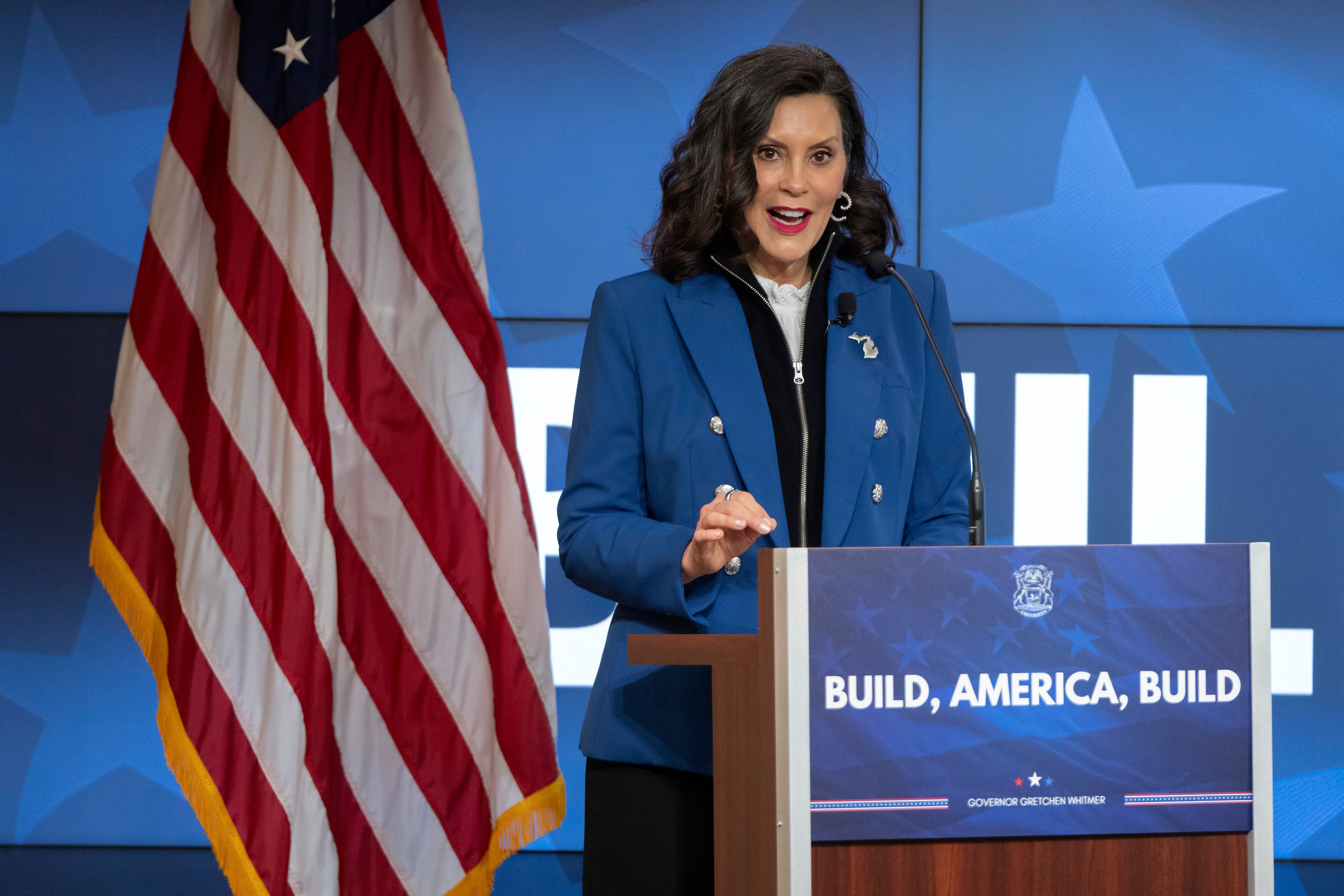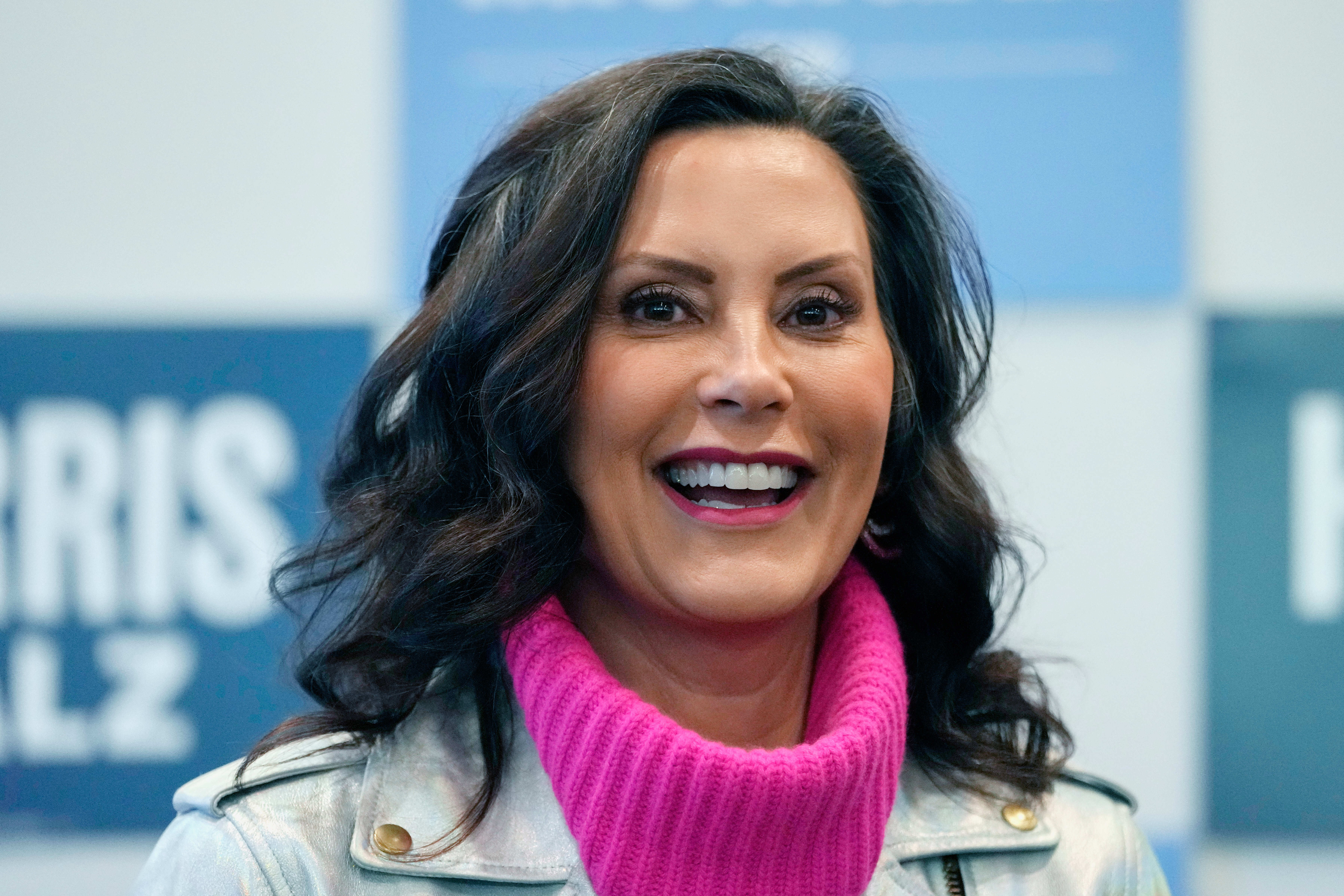A potential 2028 Democratic candidate broke with many of her colleagues on President Donald Trump’s volatile tariffs, calling them a “blunt tool” necessary to bring manufacturing back to the US in a speech.
Michigan Gov. Gretchen Whitmer, 53, drew criticism from fellow Democrats but received praise from the man at the center of the current trade dispute, President Trump.
Whitmer’s speech came just hours before she met with Trump in the Oval Office. That same morning, China responded to the president’s 104 percent tariff that had just kicked in by slapping 84 percent in retaliatory tariffs on US imports.
“I came to D.C. because I really believe in our ability to bridge political divides and make lasting progress,” Whitmer told the media.
“I’m not going to sugarcoat it. These last few days have been really tough for Michigan. Twenty percent of our economy is tied to the auto industry, which depends on a steady flow of goods from our largest and closest trading partners.”
“We’re home to the busiest border crossing in North America – more than 10,000 vehicles carrying parts and materials cross the bridge between Detroit and Windsor every weekday. We’re already seeing the impacts of tariffs: auto companies are stockpiling parts and laying off workers,” she continued.
In a shocking turn Wednesday evening, Trump decided to pause his tax levies on dozens of countries, bringing a welcomed sigh of relief for a disheveled global stock market Thursday.
-copy.jpeg)
Whitmer continued her speech by examining the implications of the tariffs for the average American, saying they would drive up the cost of a cup of coffee, gas, groceries, clothing, and alcohol: “Every one of those transactions is going to cost more because of tariffs.”
“It really is a triple whammy: higher costs, fewer jobs, and more uncertainty,” she said before adding that years of inflation along with Trump’s sweeping federal cuts had made the situation far graver.”
However, in an unexpected twist, Whitmer revealed the common ground that she shares with the president.
“I understand the motivation behind the tariffs, and I can tell you here’s where President Trump and I do agree.”

“We do need to make more stuff in America, more cars and chips, more steel and ships. We do need fair trade. No state has lived through the consequences of offshoring and outsourcing more than Michigan. We know that when you lose a factory, it doesn’t just mean losing those jobs; losing people means losing resources. It means fewer police officers and underfunded schools. It means less housing being built and fewer roads fixed.”
Whitmer said years of economic difficulty led to a “loss of purpose and identity,” and “while [she] shares the president’s goal of bringing good-paying middle-class manufacturing jobs back, it’s got to be done right.”
“I’m not against tariffs outright but it is a blunt tool. You can’t just pull out the tariff hammer to swing at every problem without a clear, defined end goal,” the governor explained.
Ultimately, she said the two political parties must work together as “friends” going forward.

“Strategic re-industrialization must be a bipartisan project that spans multiple presidential administrations. So to get it done we’ve got to work with our friends and compete against our adversaries.”
Following her speech, Trump praised the Democratic governor as a "very good person" who had done an "excellent job" – a notable flip from his tone during his first presidency, when he was highly critical of Whitmer.
Meanwhile, Colorado Gov. Jared Polis pushed back on her remarks on X, writing: “The “tariff hammer” winds up hitting your own hand rather than the nail. Tariffs are bad outright because they lead to higher prices and destroy American manufacturing. Trade is inherently good because both parties emerge better off from a consensual transaction. While sanctions (Russia, Iran) can have a geopolitical national security role, it should always be considered eyes wide open that sanctions harm both ourself and others.”
While Trump said he would impose a 90-day pause on many of the countries facing fresh tariffs, Beijing, on the other hand, would face a hiked-up rate of 125 percent “effective immediately” – a staggering rise from the 104 percent levy that kicked on Wednesday.
In the heat of the economic turmoil, US Secretary of the Treasury Scott Bessent said that the White House’s slap tariffs on China were a “negotiating strategy” and suggested it was all part of Trump’s plan to goad them into his game plan.
Spokesperson Karoline Leavitt said, "Many of you in the media clearly missed the art of the deal," adding, “You clearly failed to see what President Trump is doing here."
China and the U.S. are now embroiled in a brutal trade spat, and tensions do not appear to be simmering down anytime soon. China vows to enforce countermeasures against the US if necessary.
‘This was the plan’: Fox News hosts celebrate Trump backing down on tariffs
Trump administration accused of ‘insider trading’ over 90-day tariff pause: Live
Tariffs live: EU pauses counter-tariffs on US for 90 days but warns Trump over deal
Ukraine war live: 155 Chinese fighting for Russia says Zelensky as UK hosts summit
Republican senator admits he doesn’t know what Trump’s ‘endgame’ is
Trump declares shock tariff U-turn came ‘from his heart’ as markets surge







